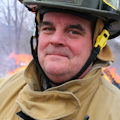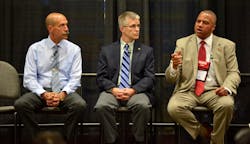Find full coverage of Firehouse World in San Diego this week on Firehouse.com and also on Twitter and Facebook.
There’s little question that change is in the air for the fire service, from changes in the fundamental sciences, to politics and accountability for not only financial decisions, but training and personnel.
On Wednesday afternoon, chief officers from three diverse departments gathered for a moderated session at Firehouse World, with Tim Sendelbach, Firehouse editor-in-chief acting as moderator. The session was titled “Navigating the Turbulent Seas of Change,” and included Brian Cummings, fire chief (retired from the Los Angeles City Fire Department) John Tippett, deputy chief of operations, Charleston, S.C., Fire Department and Tom Siragusa, assistant chief of the San Francisco, Calif., Fire Department.
Each of the men on stage on a special section dedicated to training on the exhibit hall floor at the San Diego Convention Center had decades of experience, and has seen the highs and lows of the fire service. The personal stories and the knowledge they shared represented close to 100 years of service.
Lobbing the first proverbial “grenade” into the conversation, Sendelbach asked each chief the role tradition plays in their organization. He framed the question by comparing a high-tech European style helmet to a traditional leather helmet.
The first to speak was Siragusa who said tradition forces the fire service to consider change slowly and with thought.
“Tradition is really what has allowed us to move through turbulent times,” Siragusa said. “It forces us to give lots of thought and justification for things we’ve done and changed over time.”
Tippett said his department, which is now just seven years out of the tragic Sofa Super Store fire that killed nine firefighters, is constantly evaluating tradition and pushing progress, not change.
“Why is something a tradition?” Tippett said, noting that there are some traditions that hold value and must be maintained. “Making sure we’re helping each other is the most sacred tradition we have.”
For Cummings, tradition is the “Esprit de corps,” the feeling of pride and fellowship, that holds the Los Angeles City Fire Department together. He said loyalty and devotion to one’s job is a very important part of tradition, however, tradition has its draw backs as well.
“When tradition gets in the way of change it’s bad,” Cummings said. He added the fire service initially brushed off the emergency medical service as a “wave” that would pass and now it accounts for the bulk of most fire department’s runs.
“If tradition means you can’t be agile and flexible, you need to change,” Cummings said.
Tippett spoke of “cultural fortresses” in which firefighters can put themselves into and shroud themselves in tradition to resist change.
“We have to change the behaviors and beliefs of firefighters,” Tippett said. He made an analogy that a firefighter, like a Mixed Martial Arts fighter, can be aggressive, run into the ring and get knocked out immediately.
“He was aggressive and now his knocked out,” Tippett said, noting that for firefighters to take five or 10 seconds to take a look at the fire and do a size-up will help him from begin knocked out before the fight begins.
Siragusa said “the nexus between culture and leadership” an important area to focus on for every fire department.
To advance the conversation, Sendelbach lobbed another proverbial grenade into the conversation by asking the three gentlemen if the fire service was becoming too soft.
Siragusa said he did not believe the service is too soft, but acknowledged that the first-due company officer making strategic fire decisions can “make or break” the overall operations. He expanded his comment by saying departments need to make sure they focus on solid training for the company officers.
Adding his comments to the question, Tippet agreed that company officers and battalion chiefs should be the focus of much of the tactical training in any department. He said Charleston has dedicated a lot of resources to making sure they have the best and well trained officer possible.
While rebuilding from the devastating Super Sofa Store fire, the entire organization evaluated command competency. They practice role playing scenarios and some of the firefighters who participated in those exercises have become the captains and battalion chiefs that lead the department today.
Cummings, the retired LA City fire chief, reframed the question slightly and said firefighters want to be firefighters. They don’t necessarily want to be safety officers, or inspectors, but they need to understand those “soft skills” to make them better firefighters.
“We want instant gratification,” Cummings said of firefighters. “When we think of firefighters, we think of them in bunker gear with smoke rolling off their helmets.”
Instead, Cummins said, fire departments perhaps should look at civilian staffing to fill the roles of risk managers, safety officers and inspectors. That way those critical jobs will be filled with people who want to do it for a career and bring with them professionalism.
“That way, you won’t promote a firefighter to inspector who really wants to be back on the truck,” Cummings said.
An attendee asked a question from the audience wondering how firefighters can keep their skills up when there are no fires and rules and regulations prevent fire departments “from burning anything.”
Cummings acknowledge there are significantly less fires than ever before. That’s why it’s important to examine very fire.
“There has to be lessons learned for every fire,” Cummings said, noting that firefighters should also subscribe to read fire service publications. Each fire review will reveal little details that can help firefighters make better decisions in the future.
Sendelbach reminded the audience of the lessons of Sully Sullenberger, the U.S. Airways pilot who successfully landed a jet in the Hudson River in New York City.
“He had never landed a plane on the Hudson River before,” Sendelbach said. “It was year after year on the simulator.”
Siragusa said everything that is done prior to a fire sets up for a successful resolution to the event.
Moving on to another question, Sendelbach asked each of the three chiefs if they were agents of change in their organizations.
Cummings was first up to the plate to answer the question. He said with 106 work places and three platoons in his department change was difficult to implement. When he took office, policy was announced by video tapes sent out to each of the stations, a process that took two weeks.
“By the time everyone got the policy, it had changed again,” Cummings said, noting he changed the delivery system to digital to get it out quicker. As leaders, Cummings said it’s important the deputy, assistant chiefs, battalion chiefs and the captains “all need to be singing the same song.”
Tippett said when he was hired from Montgomery County, Md., to join the Charleston Fire Department, he was tasked with two missions – get the department in order and have the department get along with its neighbors.
Tippett said he was not prepared for the “emotional investment” the staff had in the culture of the Charleston Fire Department.
“There were a lot of people saying ‘we don’t think we need change,’” Tippett said. He said he had to win the minds and hearts of the firefighters and officers and help them have ownership of the decisions that were being made.
Cummings commented that he isolated himself for too long and didn’t look outside of LA City for training and information.
He also said he wishes he had disregarded advice that change should only be introduced at a rate that could be absorbed.
“I wish I had made the changes that I knew were right sooner,” Cummings said. “I wish I had pushed them through right away and made the changes and let the firefighter catch up.”
Sendelbach asked a question about succession and handing command from one generation to the next. He said today’s generation is very computer and technologically savvy compared to previous generations which had experience with carpentry and plumbing.
Cummings said firefighters are expected to be “Swiss Army knives” with good general skills. He commented that maybe it’s time for departments to look for specialists with particular skills sets and talents and channel them into different areas of the fire service.
Tippett said Charleston tries to have replacements “three deep” to make sure the department could continue if something happened “tomorrow.”
Siragusa said fire service leaders need to change to fit the needs of the firefighters.
“We need to adjust to them, they don’t need to adjust to them,” he said.
Sendelbach asked about the legacy of successes each of the three departments represented had and how they affect operations currently.
Cummings responded that it’s easy for firefighters to fall into an attitude that they’re “too good for something like that to happen to us.” He said there’s “a normalization of deviance” that is not healthy for the fire service.
“It’s worked 99 times but the 100 time it goes bad,” Cummings said.
Siragusa said “good luck reinforces bad behavior” and each event should be evaluated.
Tippett said “dumb luck” helps out a lot of firefighters, but when it happens it should be discussed and become a topic for a “tailboard chat” and after action review. His department has implemented a policy where they allow firefighters and officers to acknowledge mistakes with no retribution as a way to learn and grow.
Sendelbach concluded the event by asking the chiefs to offer wisdom with 42 characters or less.
Tippett's offering included the words patience, perseverance and professionalism.
“Be safe, be proficient, be good to each other,” Cummings said.
Full Coverage of Firehouse World:
- Photos: Hands-on Training
- Science Needs to Be Incorporated in Modern Firefighting
- Competent Command Essential at Incidents
- Innovative Apparatus on The Show Floor
- Firefighters Face New Challenges Daily
- Eisner Remember, Change Discussed at Firehouse World Opening
- Photos: Day 2 of Firehouse World
- Officers Reminded to Spend Time with Rookies
- A West Coast Versus East Coast Debate
- Photos: Day 3 of Firehouse World
- Fire Service Tradition Is Challenged by Progress
- Hash Oil Labs Create Danger
About the Author

Ed Ballam
Ed Ballam served as associate editor for Firehouse. He is the assistant chief of the Haverhill Corner, N.H. Fire Department, and a National Registered EMT. He is also a Deputy Forest Fire Warden for the New Hampshire Division of Forests and Lands. Professionally, he's been a journalist for over 35 years working for a variety of publications, including employment as managing editor of a national fire service trade journal for more than a decade.
